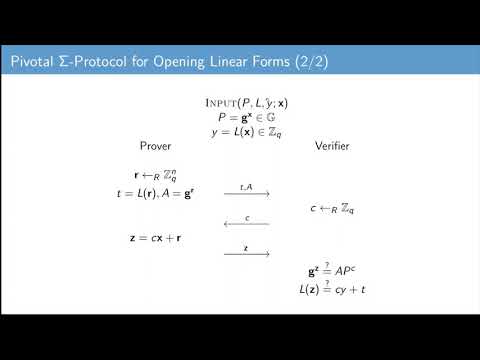CryptoDB
Compressed Sigma-Protocol Theory and Practical Application to Plug & Play Secure Algorithmics
| Authors: |
|
|---|---|
| Download: |
|
| Presentation: | Slides |
| Conference: | CRYPTO 2020 |
| Abstract: | Sigma-Protocols provide a well-understood basis for secure algorithmics. Recently, Bulletproofs (Bootle et al., EUROCRYPT 2016, and Bünz et al., S&P 2018) have been proposed as a drop-in replacement in case of zero-knowledge (ZK) for arithmetic circuits, achieving logarithmic communication instead of linear. Its pivot is an ingenious, logarithmic-size proof of knowledge BP for certain quadratic relations. However, reducing ZK for general relations to it forces a somewhat cumbersome ``reinvention'' of cryptographic protocol theory. We take a rather different viewpoint and reconcile Bulletproofs with Sigma-Protocol Theory such that (a) simpler circuit ZK is developed within established theory, while (b) achieving exactly the same logarithmic communication. The natural key here is linearization. First, we repurpose BPs as a blackbox compression mechanism for standard Sigma-Protocols handling ZK proofs of general linear relations (on compactly committed secret vectors); our pivot. Second, we reduce the case of general nonlinear relations to blackbox applications of our pivot via a novel variation on arithmetic secret sharing based techniques for Sigma-Protocols (Cramer et al., ICITS 2012). Orthogonally, we enhance versatility by enabling scenarios not previously addressed, e.g., when a secret input is dispersed across several commitments. Standard implementation platforms leading to logarithmic communication follow from a Discrete-Log assumption or a generalized Strong-RSA assumption. Also, under a Knowledge-of-Exponent Assumption (KEA) communication drops to constant, as in ZK-SNARKS. All in all, our theory should more generally be useful for modular (``plug & play'') design of practical cryptographic protocols; this is further evidenced by our separate work (2020) on proofs of partial knowledge. |
Video from CRYPTO 2020
BibTeX
@inproceedings{crypto-2020-30464,
title={Compressed Sigma-Protocol Theory and Practical Application to Plug & Play Secure Algorithmics},
publisher={Springer-Verlag},
doi={10.1007/978-3-030-56877-1_18},
author={Thomas Attema and Ronald Cramer},
year=2020
}

